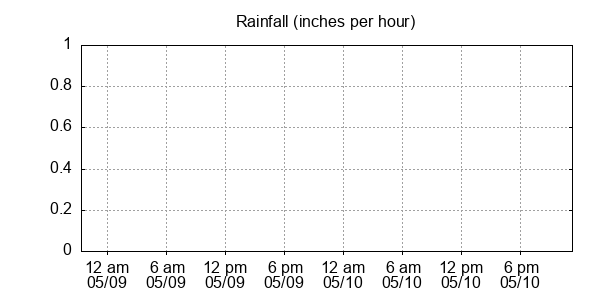rainfall
- Real Time Data
- 48 Hour Charts
- Yearly Averages
- Sensor Specs
- Sensor Calibration
- Data Access
| Current Conditions | Percentage of Annual Average | |
| Last hour (inches) | 0.0 | 0.0 |
| Last 24 hours (inches) | 0.4 | 1.3 |
| Last 48 hours (inches) | 1.0 | 3.1 |
| Last 7 days (inches) | 2.9 | 9.2 |
| Last 30 days (inches) | 4.3 | 13.8 |
| Year to date (inches) | 8.9 | 28.7 |
| Rainfall Year, since July 1 (inches) | 18.9 | 61.3 |
| Rainfall Year, since Oct 1 (inches) | 18.3 | 59.1 |
| Last update: Wed Feb 18 20:10:01 2026 PST | Average yearly rainfall: 30.92" | |
Rainfall
Rain is the condensation of atmospheric water vapor into drops heavy enough to fall, often making it to the Earth's surface, and is the primary source of fresh water for most areas of the world. Because rainfall washes both organic matter and pollutants off the land and into the ocean, researchers are interested in tracking fresh water run off. Rainfall observations are used in conjunction with salinity measurements to observe river outfalls that create freshwater plumes in sea water. Meteorologists use rainfall and precipitation levels for tracking droughts, storm cycles and flood patterns. Ecologists study the effects of rain on primary productivity and animal life cycles.
Rainfall is measured with a tipping bucket rain gauge.

| AVERAGE TEMPERATURE | RAIN | RELATIVE HUMIDITY | |||||
| Month | Minimum | Mean | Maximum | Inches | 4 am | Noon | 4 pm |
| January | 41.4 | 48.5 | 57.1 | 6.86 | 84 | 74 | 80 |
| February | 43.8 | 50.2 | 58.0 | 4.56 | 84 | 78 | 79 |
| March | 44.6 | 51.8 | 57.6 | 4.85 | 90 | 85 | 85 |
| April | 45.5 | 52.7 | 58.6 | 1.67 | 90 | 84 | 84 |
| May | 46.5 | 53.6 | 58.8 | 0.40 | 92 | 87 | 86 |
| June | 48.4 | 55.1 | 61.1 | 0.16 | 93 | 86 | 86 |
| July | 50.3 | 55.7 | 62.6 | 0.12 | 95 | 89 | 88 |
| August | 51.7 | 56.2 | 63.2 | 0.14 | 95 | 91 | 90 |
| September | 51.7 | 55.9 | 64.6 | 0.57 | 95 | 90 | 90 |
| October | 49.7 | 55.8 | 63.4 | 1.80 | 92 | 86 | 88 |
| November | 46.3 | 53.1 | 61.7 | 5.28 | 86 | 78 | 83 |
| December | 43.0 | 48.5 | 58.3 | 4.51 | 79 | 68 | 75 |
| Whole Year | 46.9 | 53.1 | 60.4 | n/a | 89.6 | 83 | 84.5 |
| Total Average Yearly Rainfall | 30.92 | ||||||
|---|---|---|---|---|---|---|---|
 Rainfall Gauge
Rainfall Gauge
Instrument Type: Hydrological Services TB4 Tipping Bucket Rain Gauge
Description: 200 mm diameter funnel directs precipitation into a bucket mechanism that tips when filled to a calibrated level; pulse-counting circuitry tallies number of tips
Location: 40 m from coastal bluff
Latitude 38° 19' 01.58" N
Longitude 123° 04' 18.61" W
Installed: September 2003
Specifications:
Resolution: 0.254 mm (0.01")
Range: 0 to 700 mm/hr (27.6 in/hr)
Accuracy: Better than 2% @ 500 mm/hr (19.7 in/hr)
Acquisition Settings:
15 second running total
Total tips logged hourly
Sensor Calibration and Quality Assurance Procedures
Rain Gauge
Equipment:
- Hyrdological Services TB4 Tipping Bucket Rain Gauge S/N 02-192
- Funneled Rain Bucket with Graduated Staff
Procedure:
After a rain shower, the amount of water collected in the funneled rain bucket is measured with the graduated staff. This value is used to check the amount of rainfall recorded by the tipping bucket rain gauge. After measurement, the bucket is emptied to prevent later comparisons from being affected by residual water in the bucket.
Rainfall QA/QC'ed Datasets (1970-present)
